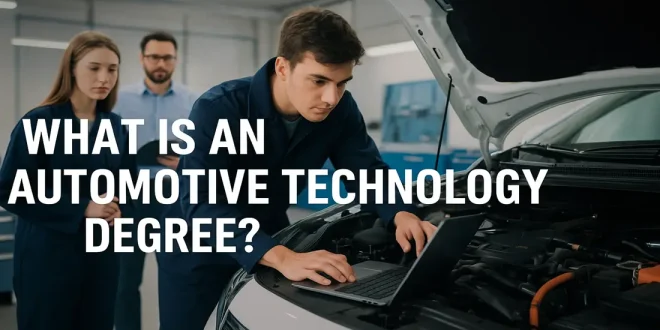Technological advances, sustainability, and innovations are all positive attributes that are factors that come with the most rapid change ever seen in the automotive industry today. The development of this industry is currently focusing of Automotive Technology Degree which involves the integration of Engineering, Mechanics, Electronics, and Computer Science. This is the reason anyone with a passion for cars is encouraged to get an Automotive Degree. This can lead to a very rewarding career that is guaranteed for the future.
What is an Automotive Technology Degree?
An Automotive Technology Degree is a type of program that intends to give students technical skills, practical experience, and analytical skills required to The automotive industry is a major focus for this program. This focus intend to provide design, diagnostics, and maintenance for the modern vehicles which are operated by some of the most advanced technologies and computer systems.
This degree is associated with a particular range of the following subjects. These are:
- Vehicle safety systems and sensors
- Automotive mechanics and diagnostics
- Transmission and drivetrain systems
- Internal combustion engine systems
- Electric and hybrid vehicle technology
- Automotive electronics and software integration
Theory lessons focus on problem-solving techniques and the actual fixing of automotive problems. This is supplemented with practical fixes and diagnostics on the actual vehicles. This blend of both theory and practical fix makes automotives graduates highly sought after. The ratio of theory to practical is sometimes skewed. Critical theory lessons focus on automotive problem-solving techniques and the actual fixing of vehicles. Topic that make automotives graduates highly sought after cover the ratio or theory to practicals is sometimes skewed.
Automotive Technology Degrees
For every type of program, there are specific career goals along with a different prospective level of commitment. Program goals include:
1. Script or Certificate Programs
These courses, designed especially for automotive technicians and service specialists, are focused on the fundamentals of the area and can be completed within a time frame of 6 and 12 months.
2. Associate Degree in Automotive Technology
A. Most common degree rest, covers basic automotive systems along with the rest of passive automotives buildings. This can be completed in two years in any technical institute or community college.
3. Bachelor Degree in Automotive Technology
Complete within 4 years. These majorly cover advanced syllabus, rest.
4. Master’s or Advanced Programs are a Degree Above The Rest
Though it’s rare, some colleges extend postgraduate programs in automotive engineering, innovation, or manufacturing technology. Other postgraduate programs are designed for people wanting to work in the automotive design, R&D, or industry management.
Core Courses and Curriculum Overview
The base knowledge in automotive technology requires a balance between theory and practice. Here are some subjects you will study:
Automotive Technology: Internal combustion and fuel systems, performance tuning, and principles of automotive engine performance.
Electrical and Electronic Systems: automotive computer networks, wiring, sensors and microprocessors, and networks.
Brake and Suspension Systems: chassis dynamics, ABS, and EBD.
Automatic and Manual Transmissions: Gear systems and power, transfer, and diagnostics of automotive systems.
Advanced Vehicle Diagnostics: Use of automotive diagnostic equipment and OBD (On Board Diagnostics) systems.
Hybrid and Electric Vehicles (HEVs/EVs): Electric motors, regenerative braking, and battery systems.
Automotive Safety and Emissions: Safety system integration, compliance standards, emissions control, and systems in automotive engineering.
Most programs today also have a mandatory internship or cooperative education with automotive manufacturers or automotive service to gain practical knowledge before graduation.
Skills Achieved from an Automotive Technology Degree
With an obtained degree in automotive technology, you will possess a collection of both valuable and applicable skills, such as:
Technical Competence in Repair: Achieving an ability to troubleshoot and resolve various intricate problems facing an automobile.
Mechanical Skills: Capability to restore, service, and enhance different parts of a motor vehicle.
Information Technology Skills: Use of software and vehicle programming tools, ECUs and other devices of vehicle interfacing.
Establishing Goals: Skills and ability to analyze and make evaluations basing on the results obtained in a system.
Creative Thinking and Problem Identification: Solving different problems facing an automobile in real life situations.
Collaborative and Decision-Making Skills: Very crucial in working with engineers, producers, and customers.
Automotive Technology Degree Career Prospects
Professionals in the automotive sector and many other domains will be interested in your skills. Some of the options available to you will be:
Automotive Service Technician: Deal with identifying and repairing vehicles for service facilities and automotive dealerships.
Automotive Engineer: Design, develop and improve associated systems and technologies for vehicles.
Diagnostic Specialist: Work on complex vehicle problems using advanced systems and sophisticated software.
Electric Vehicle Technician: Work on the ever-expanding sector of EVs focusing on charging and batteries.
Automotive Systems Analyst: Work with vehicle data and analytics to improve performance.
Service Manager or Shop Supervisor: Direct the processes within a repair business and teams of technicians.
Field Service Representative: Liaise with OEM to assist in troubleshooting and implementation of solutions.
As the automotive industry pivots to EV, autonomous driving, and smart transportation there continues to be a gap in software development and integration, artificial intelligence, cyber security, and mobility solutions.
Future Trends in Automotive Technology
Every day there is a new prediction of what technology is in our vehicle of the future. For a person with an automotive technology degree, the prediction should be cosmetic. Following are what we expect to see in the near future:
Electrification: Rapid expansion of EV production and infrastructure.
Autonomous Vehicles: Vehicles with AI and sensor-based navigation systems.
Connected Cars: IoT V2V and V2I communications.
ADAS: Active lane keeping, adaptive cruise control and basic collision avoidance.
Sustainable Manufacturing: Use of green construction materials, recycling, and the production of eco vehicles.
Such advancements indicate that many professionals skilled in automotive technology will be sought after in every corner of the world.
Why Choose an Automotive Technology Degree?
Selecting an Automotive Technology Degree is much more than simply a career decision – it is a decision that focuses on an advancing world with a well integrated technology system. The automotive world is filled with new potential and gaping opportunities for great pay, a secure job, career advancement, and the added bonus of working on newer technologies that aid the humanity in the mobility revolution.
Whether it is your interest in gaining the ability to repair sophisticated engines, work on the designing of electric powertrains, or even work on the systems for self-driving cars, this degree offers the complete package tailored for success.
Conclusion
A career in automotive technology is particularly interesting and in fact necessary in an age of ever evolving vehicles that are more integrated, more intelligent, and more eco-friendly. You are simply presenting yourself as an skilled professional who is ready to do some real work with a degree in Automotive Technology in a field that has ever so incrementally globalized.
The time to step on the accelerator is now for those who are interested in vehicles, curious about new technology, and who wish to be a part of the transport revolution.

